#meta meta cognition
Explore tagged Tumblr posts
Text
Someday, Shine With Me...

It's Christmas Eve. It's 1997. You actually went to see the AWESOME Utena Musical over the weekend, and you have rewatched your VHS tape recordings of the last episode a dozen times.
You've been jamming out to Internal Clock, Municipal Orrery. You obtained a time machine to pour over episode commentaries by Ikuhara and Saito that cover the last three episodes. You've already stolen the script from be-Papas' office. You've even got a screencap gallery of it!
You've been watching along with some other internetizens, because forums are cool.
You've been staring at the insane art drop by Akemi Hayashi for this month's Animage Magazine:
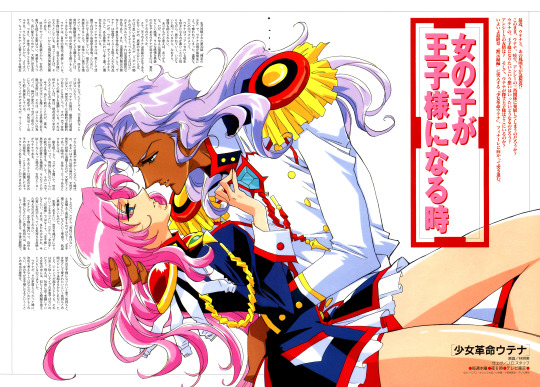
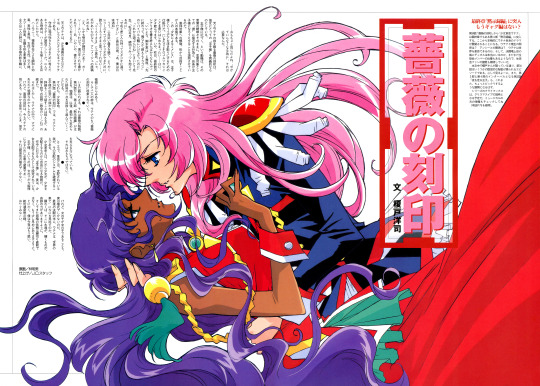
You've been poring over the to-be-released creator commentary, transcribed by Vrai Kaiser, whose articles about Utena have been living rent free in your future head all year:
There are two meanings to the Japanese word utena. One is “the calyx of a flower.” That’s also the meaning of the title, of course. The thing that supports the beautiful petals; the one with the noble heart. And the other meaning of utena is “tall tower or pedestal.” We translated this into a visual: the tower at the center of Ohtori Academy, the one with the Chairman’s room on the top floor. And the dueling arena located deep in the woods is the same. In the early stages of production, when the story wasn’t firmly established yet, this was one of the aspects I most wanted to visualize and produce for the screen. A world where demons roam. In its center, a tower called the “Tower of Revolution.” Whosoever can remain victorious in his battles against the demons can reach the pinnacle of the Tower of Revolution, and at the same time receive the power to revolutionize the world; the power that changes the rules of the world. However, when he reaches the pinnacle, he learns the world’s governing laws. He faces the ultimate choice: will he stay nobly, beautifully powerless? Or will he accept ugliness into himself and gain absolute power? He desired both. Or rather, perhaps he couldn’t choose either. His mind in anguish, he divided himself in two. His “noble heart,” and the “adult with absolute power.” And so. With one last wish that the day would come when someone would awaken him, the “noble heart” that had lost its body, in other words the prince, fell into a deep sleep. Early on in the series’s conception, I kicked around the idea of placing something like the above at the heart of the story. Later, after several changes, it became the tale as you know it, but without a doubt, he did reach the pinnacle of the Tower of Revolution. It was a place where “eternity” dwelled. And “eternity” turned out to mean perpetual sleep. The prince (Akio) who became an adult while in perpetual sleep lost something. What he lost was “the power to create an enjoyable future.” Revolution means gaining “the power to imagine the future.” The prince chose to sleep on, and the princess chose to wake up. At the top of that tall tower, the princess bid farewell to the prince. No – she wasn’t the princess any longer. She quit being “a person (thing) ruled by someone.” The victory bells rang, but there was no “tower (rule)” beyond them now. She’d learned where freedom lay. She crossed the threshold of that “Door of Revolution” which had always been closed to her before, and began walking. The “girl’s revolution” lay in the girl’s future. “Wait for me…Utena.” The world (the stage) is free and wide.
You're not ready for Utena to end. Which is good, because it isn't going to. Not for you. Decades from now, Utena will still be here, speaking to you. Challenging you. Changing you.
#revolutionary girl utena#rgu#sku#shoujo kakumei utena#utena#utena tenjou#anthy#empty movement#utena meta#utena resources#i know it's not christmas eve just yet i am in the middle of working six of seven and the cognitive load of scheduling this post is just to
265 notes
·
View notes
Text
I'm not sure if I believe the "Wakaba Isshiki did unethical experiments" theory in the fandom, but I do think this is the biggest proof of it in-game:

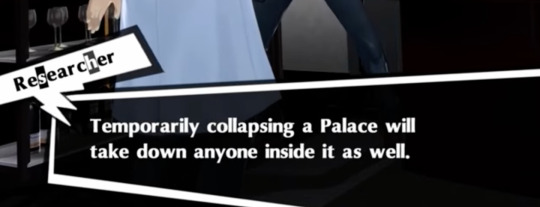

Because how the hell would she know that?
The first explanation is that she did experiments by sending people into palaces and then testing what happens to them if the palace collapses. Which is messed up for obvious reasons.
The second explanation is that she did NOT test it, meaning she was just making shit up. Which is funny but also would make her a terrible scientist. This explanation is less believable because everything else about her research is too accurate.
There's also a theory that Wakaba did unethical experiments on Akechi specifically. I'm not sure I believe that, since the evidence for it is pretty shallow (like the featherman game scientist experimenting on grey pigeon). But this scene is once again the biggest argument you could make for that theory. The researcher in the image above refers to palaces by their correct term 'palaces', which they say was based on Wakaba's research. But that's only something you would know with firsthand experience of the metaverse. And the only person they know who could access the metaverse was Akechi (that we know of, but i dont think Shido would rely only on Akechi if there were other options).
So yeah this scene is very sus. It's most likely the writers didn't think too deep about the implications. There's no way they wanted Futaba's mom to be sketchy, right? But even if it's not intentional, the scenes and their implications still exist. So in conclusion those theories make sense, I get it, and I don't blame anyone for headcanoning them and having fun. And tbh anyone involved with cognitive psience was portrayed as some degree of unethical (maruki for example), maybe this is just on-brand
#i really wish the game explained what the cognitive psience research thing was like more#like WHO are those people following joker at the end of the game. and WHO are those men escorting akechi in the end credits#shuake always matching because theyre both being stalked by men in suits for some unexplained reason#also about that featherman game#we all know grey pigeon is supposed to be akechi#but personally i dont think the scientist in that game is wakaba. thematically it feels more like shido#but regardless the game implies some stuff that akechi went through#either he was experimented on by cognitive pscientists (if you take the game literally)#or it's supposed to be a metaphor for the grooming shido did to him. endangering his life and controlling him with promises and praise#uggghggh thats so awful. someone pls just let the boy be happy#my post#persona 5#persona 5 royal#wakaba isshiki#futaba sakura#goro akechi#p5r wakaba#p5r futaba#p5r akechi#shido masayoshi#phantom thieves#p5r shido#p5r analysis#p5r meta#persona 5 meta#p5r#shuake#tagged shuake because i mentioned them in the tags even if the post itself isnt rlly about them
436 notes
·
View notes
Text
Who Killed Goro Akechi?
Titled thus because I was just going through the scene right after Mementos merges with reality, after they've failed to defeat the grail, and "Igor" tells Akira that he's lost the game.
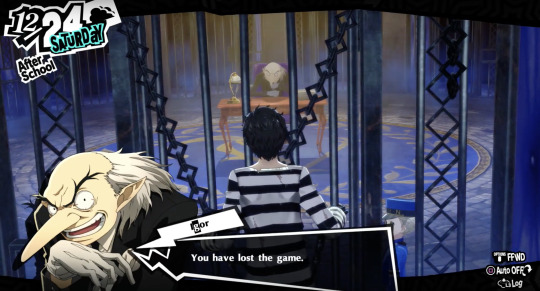
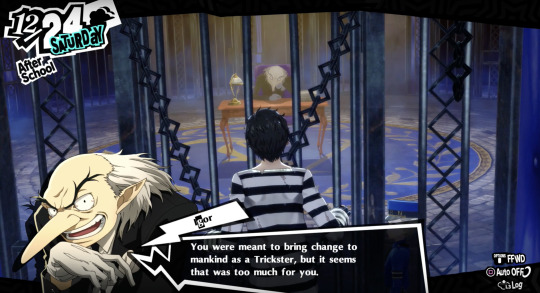
And I'm like, ok, I've seen this a fair few times before. I know the script.
But then I was paying attention, and I just went WAIT WAIT WAIT HANG ON A MINUTE HERE.
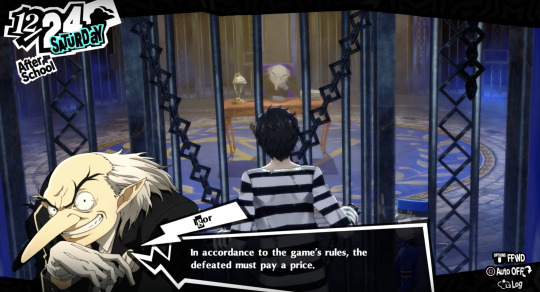
"In accordance to the game's rules, the defeated must pay a price."
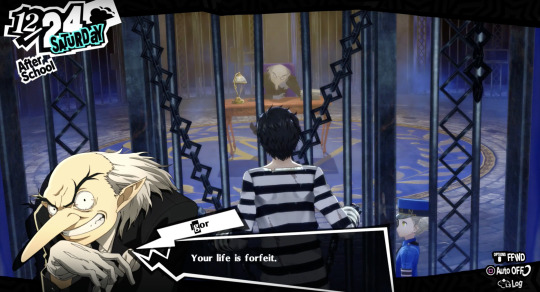
"Your life is forfeit."
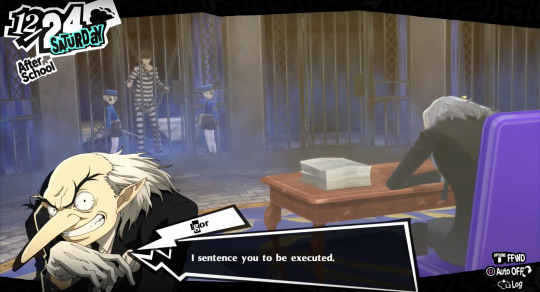
"I sentence you to be executed."
And I was just... hang on. There's been more than one player in the game. If we go back to the earlier lines, "Igor" also says "You were mean to bring change to mankind, but it seems that was too much for you."
In a sense, all of this could also be applied to Goro Akechi.
Akechi was also forcing mankind to react and to change, albeit via chaos and uncertainty rather than encouraging people to stand on their own two feet the way the Phantom Thieves were trying to.
And what happens in the engine room?
Akechi loses the game.
He realises that Akira and the PT fooled him, and when he tries to get the better of them one last time, he fails. We often talk about how after he was defeated he "almost went over to their side" - but isn't that another aspect of his "defeat" in Yaldabaoth's eyes? Akechi admits, effectively, that he accepts the Phantom Thieves' way of doing things over his own.
And it's here that we get Cognitive Akechi, who comes in and starts talking about how the Captain (Shido) sees him, gives him an option to rejoin (or for the PT to switch sides), and.... hm, isn't that familiar?

Here's Caroline saying "If that's what our master wishes..." with Akira having a response tree of-
-"You're going to execute me?" -"Are you serious?" -or just plain being unable to speak (he could also be unspeakably angry, but he seems far more scared than angry, here).

Next, Akira refuses to die, because he has people relying on him.
I'm reminded of how with Akechi, once he's behind that bulkhead door, if you haven't finished his confidant he'll say something to the effect of "So my final enemy is a puppet of myself, how fitting."
If you have maxed his confidant? You get Joker telling him he can't die yet, as he has a promise to fulfil ("I'll hold onto your glove") with the implication that it's something that Akechi can use as motivation to want to keep living.
In both, it's "I can't die, I have a reason to live, and that reason is at least one other person."
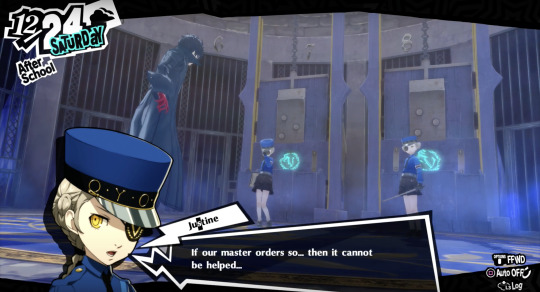
When the twin wardens try to "execute" Akira, now in his Joker attire as his will of rebellion has manifested, Justine says "If our master orders so... then it cannot be helped..."
I'm reminded of how Cognitive Akechi was a being of pure servitude toward his Captain (master), Shido. If the Captain willed it, he'd even die for him.
This one feels similar, because the twins were never supposed to have "execution" as part of their duties at all, and both parties were pushed into a sense of unfailing loyalty to someone who never cared for them, and who warped their duties to something wrong.
In fact, I just went back to confirm the lines for Cognitive Akechi, and-
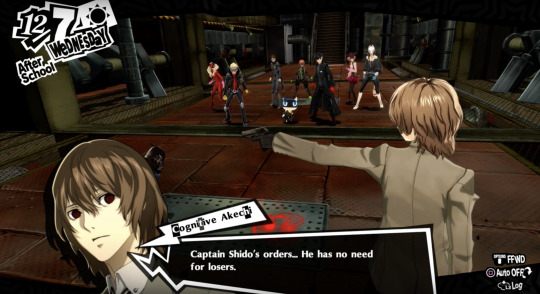

Yup.
Top is Cognitive Akechi saying "Captain Shido's orders... He has no need for losers." and the lower one is "Igor" saying "You have lost the game."
Basically, the same lines.
To the point that...


Cognitive Akechi: "Here, I'll give you one last chance. Shoot them."
God of Control: "I shall grant you an opportunity to make a deal with me."
Both times, it's clear that this is the wrong thing to do, and in both cases, the person being offered rejects said deal entirely - Akechi by shooting the switch to activate the bulkhead door, making it impossible for his cognitive self to attack the Phantom Thieves, and Akira by denying Yaldabaoth and reaffirming his bonds with the Thieves once he's told that they're also there.
I titled the post the way I did, because the way Shido is used by Yaldabaoth, I would not be surprised if Cognitive Akechi isn't just a product of Shido's mind protecting him against threats from, say, his own attack dog, but also?
This is Yaldabaoth's way to quite literally execute the first piece he started to play with, since Goro Akechi had failed as a Trickster and had "lost the game" - and as he and cognitive Akechi both say, losers end up dead.
So the question is - who really killed Akechi? Was it Shido's cognition? Was it Yaldabaoth? And was that cognition even an original part of Shido's palace in the first place, to that extent? How much was it "appropriated" at the "right" time, here?
There are far too many coincidences for me to pass it off as such
But the highlight for me at least, is this:
In both terms of Akira and Akechi's "executions," it's their sense of thinking and feeling that "I can't die, I have a reason to live, and that reason is at least one other person" that keeps them alive. And to the point, it's what keeps Akira's sense of rebellion so strong, and against nigh insurmountable odds.
If anything, it supports the fact that with Akechi's confidant maxed, he really does live, because that, too, echoes Akira's experience in the Velvet Room not even a full month later.
#p5 stuff#goro akechi#Akira kurusu#persona 5#p5 joker#cognitive akechi#p5 yaldabaoth#I went into the videos to do canon recap and wound up with meta#this is my life
239 notes
·
View notes
Text
Buffy- Hanging out with Spike is not cool, Dawn! Okay? It's dangerous, and icky.
Also Buffy- Dawn could be in danger. Must go to Spike for help.
#Buffy's cognitive dissonance regarding Spike would be funny if it wasn't so sad#to be clear this isn't anti Buffy#I understand why she had such a hard time reconciling the truth of her heart with the truth of her mind#Spike is literally the second worst vampire ever recorded#he killed two Slayers#he tried to kill her#and as far as she can tell the only reason he hasn't is because of the chip#plus he doesn't have a soul#which from her experiences with Angel makes her think there's no WAY he could be good#so despite the evidence that he's becoming good#she can't bring herself to believe it#not until fear causes her to think with her heart instead of her mind#anyways#buffy the vampire slayer#buffy summers#spike btvs#william the bloody#william pratt#spuffy#Buffy meta#spike meta#spuffy meta
151 notes
·
View notes
Text
the fact that Tesla’s ghost deliberately led Vash and Knives to her body is SO huge fr. it would have been so easy to make it a chance discovery, to keep her as a passive catalyst to kick-start the twins’ character arcs, but NO, she CHOSE this. “I will not be forgotten” she said. “my life was short and painful but most importantly it WAS.”
we don’t know what she expected to happen - whether she just wanted her brothers to know they had a sister, or wanted to caution them about humans’ capacity for cruelty to those that are different from them, or to galvanize them to seek justice on her behalf. but she wanted something. she was a person who could want things, even after she was dead.
(the implications wrt Plants, as interdimensional beings, possibly being able to persist at least in part after the death of the physical body in this dimension are also insane, but that’s a whole nother thing. just saying: she could still be out there)
#she went all cognitive shadow. kelsier style.#meta#trigun#trimax#tesla#vash the stampede#knives millions
176 notes
·
View notes
Text
My specific read on John is not that he's a nice guy, either. It's that, like any good character (specifically a tragic character, which, TM has said that he is modeled on a mythical tragic hero, so) he has a flaw that dooms him. And what that means is, when he has the choice to change what he's doing, that flaw either prevents him from taking the option he's aware of, or prevents him from being aware that there is another option altogether.
And so as a writer, what I look for are moments where either:
something good about a character becomes an excess that harms themselves or others
we receive information that shows a persistent blind spot a character has
we look for times when a character gives their view of the world/a situation and it Does Not Match Up with reality, or is hinted that it doesn't
we look for evidence of something simmering under the surface that clashes with their outward, agreeable presentation
What fills that role for John?
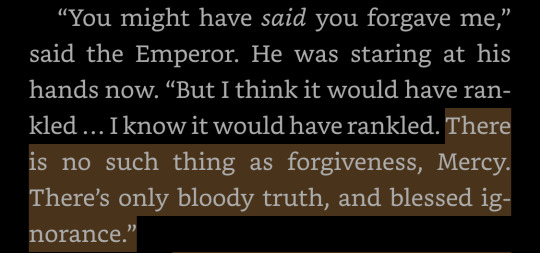
Yep.
When this first pops up, it's pretty easily dismissed as yet another layer on the falsehood he's propped up. Admittedly, he's been doing it for ten thousand years, so it's probably got a few layers to it.
However:

This one, to me, gives us a hint about what John is blind to: That his friends see his vindictiveness and his failings and that they could still love him. This is where it crosses into tragedy, for me; where his own inability to forgive blinds him to the capacity that other people have for generosity--and so, to a world where "justice" means more than "vengeance for the dead".
And this illuminates the whole chain of events that leads him to that climactic scene in Harrow the Ninth, telling Mercy that she never would have forgiven him anyways:
John is, at heart, deeply angry--like most characters in the series, and like a lot of people who grew up in poverty, especially if they managed to escape it. He also has some deep sense of justice, and deep sense of judgment.
So we have this cycle of related emotions and ideas: Justice, judgment, outrage. And a human measure of selfishness, amorality, double standards, etc.
In one situation, this allows him to throw himself completely into the cryo project, something that (if it hadn't been sabotaged politically) could have made a difference to humanity. He brings in people who work to make it even better, who demonstrably want to make the outcome as just and humane as possible. It's also implied that this is part of why he received those powers; "I chose you to change."
(And, I'll be honest, one of the other things that I see that chafes me is the implication that there was nothing about John to recommend him to the Earth. I'm actually of the opinion that there was; she chose him, and I don't think she just rolled a d100 or drew a card off a tarot deck and called him up. John is also still a human, flawed person.)
Then, the situation changes. It's no longer an issue of dedicating expertise to solve a problem; this is a political issue, and specifically of rich people using their resources to shift outcomes towards the one they think will benefit them the most, that will secure their survival, explicitly at the expense of everyone else.
And their strategy is, profoundly: short-sighted and unnecessary (pooling resources would help create a better outcome for everyone, including the rich, by reducing global trauma and preserving more of the systems that already structure their world); bigoted and uninformed (many rich people think that the world has to be a certain way, generally that the world is violent, competitive, dog-eat-dog, etc., and someone has to be "on top", and there will always have to be a loser, or lots of losers); and utterly cruel, unjust, and pointless.
And John--John, who grew up poor, who grew up aware of the despair around him and the injustice of his position and more than likely made use of that anger to achieve what he had up to this point--John is so angry.
Because they're all the same. They're all the same. It's the same song, over and over again, no matter how stupid and pointless and unnecessary. He is certain, beyond a shadow of a doubt, that it doesn't have to be this way. He passes judgment.
But John is losing to them, because he doesn't have the resources they do. He can hate them and fight them all he wants, and it doesn't matter, because he's nowhere near in the same league as they are politically.
And then, after the cryo project is cancelled, he gains his powers.
The thing about anger and judgment is that the deeper it runs, often, the more invested the person who holds that anger in themselves is in not seeing what they hate in themselves. E.g: John has conceptualized the people he's resisting as fundamentally unjust, cruel, amoral, and bigoted. There's a very good chance--to different degrees, depending on the person--that becoming aware of similar traits in himself might wake up those feelings he has towards those other people--aimed at himself (that is, cognitive dissonance). He can't see the things he's passed judgment on in himself and function. He's not like them; he's trying to fix things, to bring about justice.
Of course, there's justice as in "living in a just society", and justice as in "justice for the dead". But that's a later realization, because right now, everyone is still alive.
So John hides those parts of himself; from himself, from other people. So thoroughly he can exclude it from his consciousness and pretend it doesn't exist. He thinks no one sees the real depth of his own rage, his own cutthroat pursuit of a solution. And then, when he can't pretend it doesn't exist, he can still pretend to be the man he thinks they need him to be. He can "fool" them. He can say--he's trying. He screwed up. He doesn't know what he's doing.
And then, Casseiopeia says, No, actually, we know you, and we know you're horribly vindictive. And we're on your side--we're on the same side--our fight is your fight--and we love you. But your drive for revenge is seriously limiting your ability to imagine and create a living, just world, and that's what we're fighting for. Remember? That's what we set out to create.
And John's brain can't quite handle this; he can't imagine that they could actually see him and still be on his side. Because he couldn't see that and still be on his side. He can't forgive; he can't imagine forgiveness.
He can't see the things he's passed judgment on in himself and function.
And, by this stage, in some ways, it's already too late to change course. But this is one of several "come to Jesus" (no pun intended) moments where John could become aware of alternatives, or could change his behavior--and doesn't.
And I think this is where we get that self-awareness from, the thing that makes him creepy and tragic but also infuriating: He is aware, but apparently that's not enough to stop him from being his worst self--so is he just pretending to be moral? Capable of making different choices but choosing not to? And the weird statements he makes later:
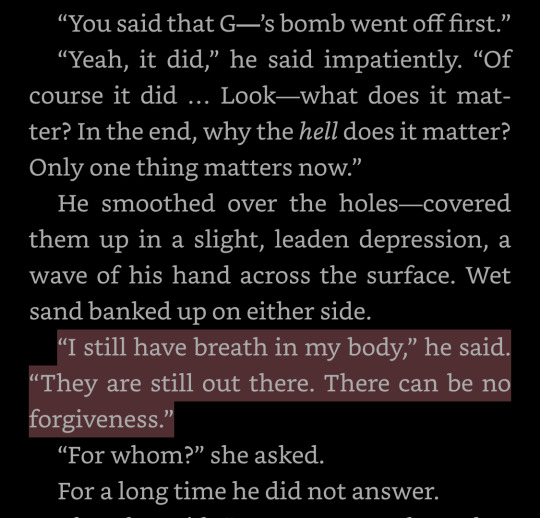
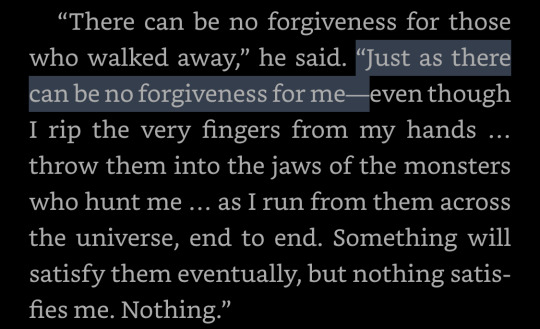
This is, imo, not a power-hungry dictator who genuinely doesn't care about the cost of his throne, or a gleefully predatory abuser. This is a dude who's committed to a course of action and doesn't feel great about it. This is a guy who has violated his own sense of justice and has to live with it.
This is a guy who set out to save the world, killed it, and now the only thing that's left to him is to avenge it.
And like, from a mythology standpoint, that is exactly what the Erinyes are, like the Furies and Alecto. They are not the justice of Apollo or Athena. They are screaming for blood. They are hunting their quarry to the ends of the universe. They are chthonic.
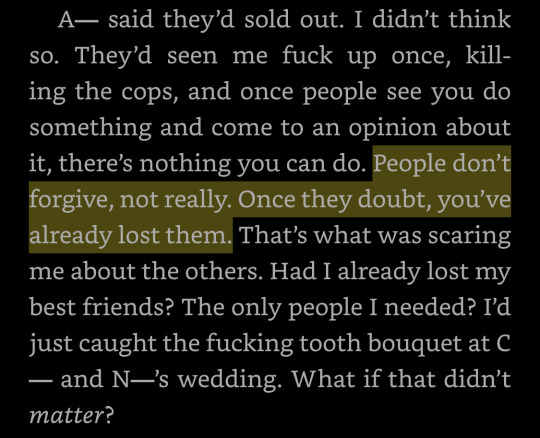
Again: This isn't what Cassieopeia or Christabel said to him. This is what John has said to himself. This came from him. This is a reflection of what he believes.
And it encapsulates, exactly, why he erased their memories. Why he took away their agency.
The difference between him and many, many people is he had the power of a god and no one to check him when he was struggling with his own worst impulses. And then, he created a world where no one could, not just because then he could do what he wanted and pretend to be kind and loving and moral, but so that he would never have to lose the love of the people he needed.
Because, unfortunately, he still needed them.
It just took ten thousand years for the lie to unravel.
#the locked tomb#john gaius#tlt meta#i'm not a john gaius apologist. i just think about cognitive dissonance a lot#and frankly tumblr and twitter are the home of cognitive dissonance
224 notes
·
View notes
Note
I wonder if Akechi just kind of...appeared in Shibuya or if he just woke up in his room as if nothing happened after what Maruki did? Does Akechi only remember that one part of Shido's Palace because he doesnt seem to remember surviving and now instead of checking into the refuge place, Akechi is placed on Christmas Eve to just turn himself in and prevent The Protagonists arrest thereby no one needs to testify in the later part of the game which is what he was arriving to do in the true ending of the game, maybe? Sorry I was just checking if Im getting this correctly because its a bit complicated., Can you clarify just what exactly does Akechi remember if anything besides that one moment in the engine room moment?.
Hi! The answer is that it's hard to tell. I don't think he has memories missing from further back in his past at all—he never mentions anything like that, and it would have a massive impact on his functioning.
And as for "after I fought you", that could mean quite a bit. We know Akechi remembers making their deal at the end, because he refers back to it on 1/2. We know he doesn't remember dying, because per 2/2 he has to deduce that for himself; I think he only commits to that conclusion after seeing Wakaba.
"until I met Ren again" suggests to me that Akechi legit blinked, found himself in Station Square listening to Sae pressure Ren into going to juvie, and stepped forward. Which kind of accounts for how odd he seems—he's in perfect detective prince mode. Sure, that's likely because Sae is there—you can see him going Detective Prince here and there in the third semester still, because his unfriendly thirdsem face is only for those in on the act!
But it might also be because he's confused; because he doesn't know how he got there, or what's going on. He's left with only his instincts—the mask which is so much part of him, that has served him so well, and the last act of his life: to pay his debts, to face up to what he's done, and to save Ren.
As for those "unclear memories" we uncovered before? Perhaps he has glimpses of memory here and there, but they don't make sense. Perhaps he remembers things and they're gone the next second. Perhaps he sees the whole truth at times, maybe in his dreams, but the pieces fall apart in his hands. Memory loss is a horror, and I wouldn't wish it on anybody.
And why is he in Shibuya? He's there IMO because Maruki has put him at Ren's side. Like, why wouldn't he? Ren desperately misses his dead friend! Maruki will bring him back and bring them together, and all will be well as they go into the sunset hand in hand. It's not his last miscalculation regarding Goro Akechi.
I don't think Akechi is returning to testify on 3/20. Ren has, after all, long ago been released from detention at this point—that came off in mid-February. Per Sae on 2/13, Ren has been cleared of all charges; even his original assault charge has been overturned. If Akechi was going to return to Tokyo and testify, I think he would have done that before Ren's release, somewhere around 2/10 to 2/12. This of course does not correspond to the dates in the event script, but then it is first draft, and likely written for a very different version of the third semester.
Or maybe Akechi's mysterious favour is something completely different. But what? Maybe he only tells Sae he intends to confess, and reports for a scheduled arrest on 3/20—but back in February, that wouldn't get Ren cleared of shit. The truth is that I really don't think Akechi's 3/20 appearance is linked to Ren's release. Those two guys he's with are just too similar to the ones stalking the PTs in their car. Akechi is part of that plot somehow, or I miss my guess.
#asks#persona 5#p5 meta#goro akechi#other headcanons may exist#rambling in window may be closer than it appears#do not bend fold spindle or mutilate in any way this ask#i've never considered third semester akechi as having cognitive damage before#i'm not sure i like it#protect him
51 notes
·
View notes
Note
Hello! What do you think about how the society in OPM accepts that King is the most powerful being in the world? While Saitama is hinted at what may become a danger to society if his strength were to become known? Considering that King has (accidentally and through his own fault) stolen Saitama's merits?
Sorry this one took a bit to answer, I had other business to attend to. This one is another long piece, but I dropped a tl;dr at the end lol.
Honestly though? I think it's perceptional bias.
Perception bias is a broad term used to describe different situations in which we perceive inaccuracies in our environment. It is a type of cognitive bias that occurs when we subconsciously form assumptions or draw conclusions based on our beliefs, expectations, or emotions.
There are several subtypes: Implicit bias: individuals hold attitudes towards people, or associate stereotypes with them, without being aware of this. Fundamental attribution error: individuals tend to blame their failings on circumstances around them, but consider that others are responsible for their shortcomings. Selective perception: expectations about people or situations affect perception.
King is revered as a strong hero and so people would accept and expect him to have strong abilities. Child Emperor pictures these abilities and describes them to King. (Cpt 152, Check) King is also tall, large and mysterious man who somehow exudes a strong aura of being strong willed, capable and a just person. But the public does not know him well enough to actually see through their bias: A physically weak and anxious man who just tries to live his life in peace, but who has heart of gold, wise beyond his years and incredible sense of justice.
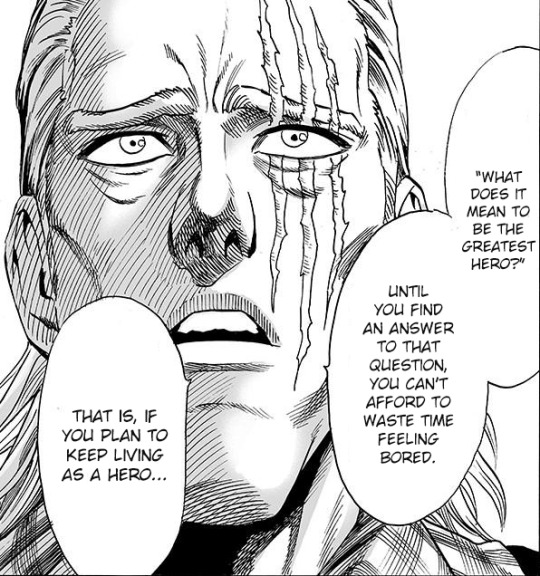
Yet despite all this, I worry for King a lot, because the cognitive bias working against him is too strong, almost unnatural. It makes little sense about why this false image is so strong, considering he nor Saitama have THAT many actually proven feats on record or even publically observed. I mean, Saitama literally destroyed a meteor and got accused for it and killed Sea King and the public turned against him...and yet none of those actual, legitimate feats are being exaggerated to this degree like Charanko describes them as in Chapter 192: Level up.
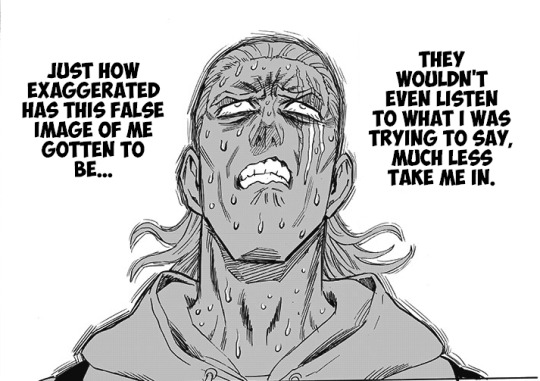
Charanko's examples are so utterly ludicrous without a single shred of actual evidence that the utter shock being told they were lies of it was enough for him to at least start shaking off that cognitive bias and question his perception and seeking out the actual truth. The guy is completely overlooked as just being a weak nobody comic relief character archetype, but he is strong willed, like when he had the guts to attack Garou in direct confrontation.
But I mean, look at this thing, this is completely absurd. Where is the entirety of OPM people's critical thinking skills?
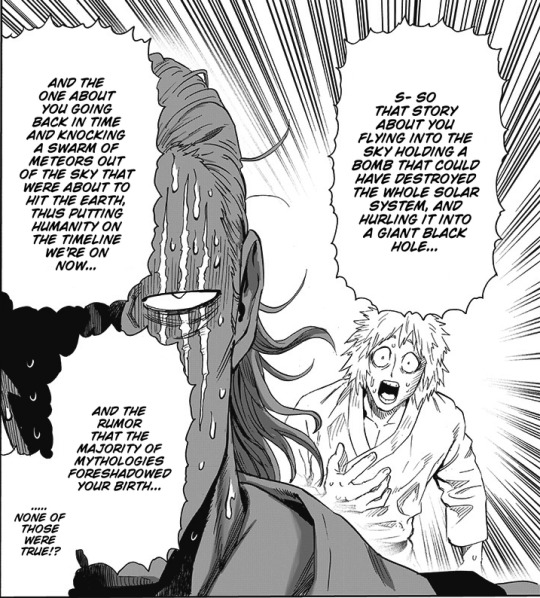
Who in their right mind would seriously believe rumours like solar system destroying level of bomb with a bonus black hole from some rando dude on the internet? Or King not having even been born yet, somehow being the second coming of christ itself?
Plus there is only one goddamn mythology piece in this entire manga that even closely fits the bill of a human(oid) character's birth being foreshadowed and that is OPM's God's mural in a place where literally nobody has seen it before.
Who the F would even be crazy enough to imagine up and spread such a rumour that King, of all people, is actually OPM God who legit nobody even knows exists? So absurd. :D

(Above image is from volume redraw)
It's such a malicious and cruel rumour too, capable of sowing distrust and discord in the entire Hero system when people stop believing in their heroes because they think the entire system is a lie. And they would blame King for it, thinking he's to blame for the lies because he broke their idea of an hero fantasy.
The only hero I can think who actually knows about OPM God is Blast, but he's not malicious. Zero motive whatsoever.
I heavily suspect Psykos for spreading it because this kind of rumour could only come up straight from the source itself. Because she's an alarmist (Cpt 175, Visitor) and OPM God has her in his backpocket to emotionally manipulate. Fubuki might uncover some more information to discover the truth, but I'd take it with grain of salt because Psykos appears to be under some kind of mental illness, possibly psychosis, as Fubuki has pointed out that she had never been a tough girl and something changed her. But I'm no detective and I'm not void of any bias, so here's a sherlock holmes quote:
"How often have I said to you that when you have eliminated the impossible, whatever remains, however improbable, must be the truth? We know that he did not come through the door, the window, or the chimney. We also know that he could not have been concealed in the room, as there is no concealment possible. When, then, did he come?"

Honestly, the magic man in the sky is prolly doing it, we just don't know how because there's not enough evidence, only context clues.
-*-
Bang on the other hand, cannot shake off his bias even if his heart is in the right place. But he was just directly told face to face by King himself that he is weak and he still refuses to believe it because he stubborny keeps believing in his own biases, thinking he's always correct.

Old people do oftentimes think they're always correct don't they? Because they're oh so old and wise and experienced. He does the same thing with Garou and Garou won't accept it.
-*-
Anyways, I worry for King's flailing mental health for reasons because he's thinking about self-harm and he wants to unalive himself by monster hand because he thinks it's already Game over for him.

The cognitive bias around people's minds is actually and ironically, shielding him from the cascading effects of the mass public outcry since he's not ready to face it yet. He lacks willpower, that mental fortitude, to withstand that kind of attack on his psyche. He might do it if people suddenly just snapped out of that cognitive bias.
Some might even say... that he's the cognitive bias itself. King can bullshit so effectively because he's can literally project bullshit out of his every orifice if he needs to. If say, he needs to protect himself or other people. And as long as people keep their cognitive biases, it would help him sustain the image that he's strong and not be hated by everyone if they suddenly snapped out of their cognitive bias. So you could say that...the cognitive bias is helping him survive and protecting him.
A cognitive bias is a systematic pattern of deviation from norm or rationality in judgment. Individuals create their own "subjective reality" from their perception of the input. An individual's construction of reality, not the objective input, may dictate their behavior in the world. Thus, cognitive biases may sometimes lead to perceptual distortion, inaccurate judgment, illogical interpretation, and irrationality.

Look, they're instantly second guessing themselves. Seems to be working very effectively. And Atomic Samurai did some incredible mental gymnastics to convince himself that just by sitting there, King just casually cut the apple even when he saw nothing and nothing literally happened in front his very eyes. (Chapter 189, Blade test.)
At least he has Saitama at his back, because Saitama has a bullshit radar a mile wide and Saitama believes he can change to be stronger. He respects King's opinion to do what is right despite knowing he lacks real power to be that force of change himself. He does not appear at a glance to show implicit bias towards King. He originally saved the guy just because he needed saving and then did it again, despite not knowing a thing about King, aside from the assumption that he must be a strong hero, even if he was asking for information to form an opinion. And then tries to dig deeper into that and questions the logic of King running away and showing lack of bias with his objectivity. (Chapter 38, King)
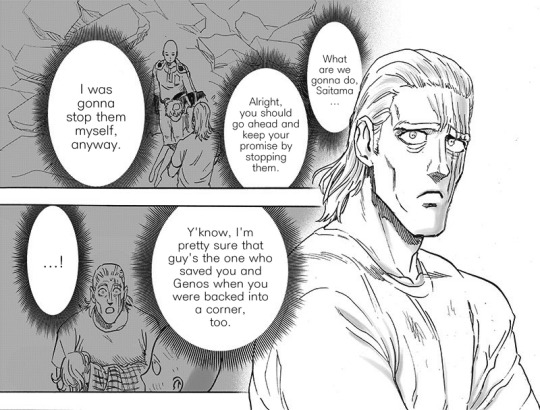
So as long as Saitama believes in King, he probably won't come to any real harm. But Saitama also has to believe in his own ability to actually help King if the need arises and act upon it, because otherwise it'll just be 166 chapter redux in the absolute worst case scenario.
-*-
So, about perceptive biases towards Saitama, they come out in negative light by default unless proven wrong by him directly.
I'll let the following panel demonstrate. (Chapter 55.7, Sense, vol 20 Extra)

The judge became immediately biased without any reason and attacked his integrity and pretended to know all about him when he actually knows nothing, despite this being ONLY a hero suit contest, not a character judgement and ignoring Saitama's explanation to why he likes to wear what he wears.

The judge won't acknowledge what he saw with his plain eyes as he refuses to believe what happened, Genos is showing different kind of bias because he too, is biased in favour of Saitama and thinks Saitama should win a hero suit contest just because he's strong, despite objectively having a really bland and cheap outfit even HE didn't like. Like a cosplay contest gone wrong if the judge just picks their favourite without any objectivity to their actual suit or performance and what is the point of the judging in the first place. Other people, despite cheering him on...show their true facets with their snide negative comments with their leaps of logic, attempting to tear him down for his good deed and nobody criticises them.
Now for a different kind of perception bias. (Chapter 16, Passed the exam)

Chewing gum might on a first glance, seem very disrespectful when towards authority figures who want your full attention because it inherently implies that the person is too busy chewing gum rather than paying attention, thus creating bias.
However the act of chewing gum in a situation where one wants to study and retain information has been seen as beneficial by studies.
Turns out, chewing gum may have more effects than simply making your breath smell good, or giving you something to do when bored. In fact, some studies show chewing gum can actually increase feelings of relaxation, increase attention, lower stress levels, and improve memory.
Saitama has shown even at the early stages of his teenager years that he DOES actually possess the attention span to study...as long as the subject actually interests him and he has selective interests. Despite all the chatter around him, he's able to tune them out and focus on his study. Give him something really dry and boring that just won't seem to stick and his attention span will waver, because attention is a resource to be managed.
Things like studying psychology can have their humble beginnings often in the interest in what affects human health, because personality types who are keen about bettering others like knowing what makes people tick in order to help them.

So it can be assumed that Saitama, knowing he has a poor attention span in boring seminars but has studied the subject before, anticipated this and simply brought chewing gum to help him focus just a bit more. Unfortunately, Snek became hostile to him and Saitama completely lost his focus and his attention wavered. This is how negative perception bias affects Saitama in his everyday life.
Another example of this selective attention span is where he watches the television because he's also interested in bettering the world as a whole, again because he likes helping other people and it brings him satisfaction. He often watches tv as an adult as well, to the point of doomscrolling. He even has Mob Psycho shirt on, a nod to ONE's other series to show that he's very empathic at his core. (Chapter 8.5, 200 yen, Vol 1 extra)

However, it is also shown that Saitama is incredibly sensitive to baseless judgement, hostility, bias and outside influence and he will get defensive and angry when faced with such and when challenged. (Meteor and Sea king fiasco) People like this who also have high moral integrity like Saitama has shown time to time again, also care great deal about their reputation in other's eyes, because it shows to them if they are doing a good job or not in their moralistic actions. Like a peer review.
Not getting any good feedback and instead met with various levels of hostility just conditions them to not try at all because they think it's their fault that everyone is against them. So Saitama early on has been faced with conditioning and now for instance, he thinks he just can't learn anything new even if he made an honest attempt. He has become insecure and self-critical and will think of himself in a negative light. (Stagnation and growth, chapter 76.) He has effectively build cognitive biases about himself and his true identity.

Here is Saitama attempting to unravel the cognitive bias around himself because he made a self-discovery. King, in his infinite wisdom, gives Saitama some objective perspective when Saitama immediately wants his second opinion about his perspective surrounding this new discovery. King, bless his heart, attempts to genuinely help Saitama but he misses the point of the discussion when Saitama was trying to see if he could bounce his ideas around, such as throwing a video game analogy to King that Saitama knows he SHOULD understand well. Saitama is just very poor at expressing his words due to his upbringing and loneliness and detatchment from emotions, especially without properly parsing it out first. He often thinks a lot louder than he seems to talk, which is why he's often misunderstood.
That is, unless he apparently connects on a deep level like with Genos and then the two of em could talk about anything and everything that comes to mind for days or until they run out of breath lmao. (Maji Drama CD vol 1, Saitama makeover)
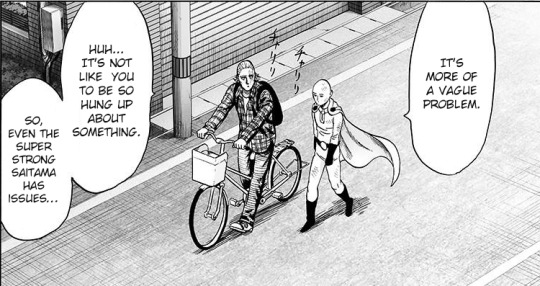
King's perception bias towards Saitama is because he just does not know him well enough and his perspective is a bit skewed because of media influence that bring him comfort for his own emotional loneliness...because Saitama is always hung up about something or another because he has so much issues it hurts. King just does not see it or is not willing to believe "Super strong Saitama" could possibly have any issues since Saitama hides them well.
Saitama has far too much free time to think and ruminate, but his own cognitive biases stop him from seeing his true self without all the negativity surrounding him. The negativity of things such as his upbringing as a lonely boy who's sensitive to hostility. (Chapter 15.5, Brushing up, vol 2 extras)
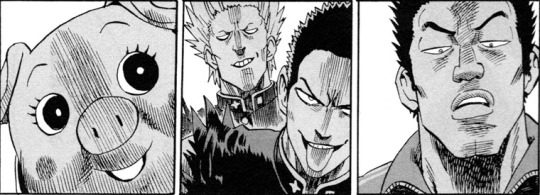
-*-
Perception bias also serves another more...sinister purpose for Saitama. Psychological conditioning. There is potential evidence for deprivation of basic needs, conditioning for violence for protection and subliminal messages for suggestion, among other things. I won't go into details because I'm afraid of also potentially spoiling stuff, so I'll keep the suspense. :D

Here's maslow hierarchy of needs pyramid that explains about our intrinsical needs as human beings to have wellness in both body and mind.
Being deprived of all these needs is akin to mental torture. But so is facing all of the underlying issues at once via hypnotherapy and cognitive behavioural therapy if the patient is sufficiently dysfunctional in a societal setting like Saitama happens to be. Especially if the therapies are performed...poorly.
CBT has shown to be the most effective intervention for people exposed to adverse childhood experiences in the form of abuse or neglect Criticism of CBT sometimes focuses on implementations (such as the UK which may result initially in low quality therapy being offered by poorly trained practitioners. However, evidence supports the effectiveness of CBT for anxiety and depression. Evidence suggests that the addition of hypnotherapy as an adjunct to CBT improves treatment efficacy for a variety of clinical issues. Post Traumatic Stress Disorder (PTSD) and its symptoms have been shown to improve due to implementation of hypnotherapy, in both long and short term. As research continues, hypnotherapy is being more openly considered as an effective intervention for those with PTSD.
In short, in order to heal mentally, Saitama may need to face mental torture because he has such strong willpower and such strong mental barriers shielding his vulnerabilities on a basic primal need. He can essentially dip himself on lava and ignore the shock reaction from the extreme heat (Chapter 112, Sacrifice) and does not even need to breathe in space and does not notice the extreme cold or pressure of space nor the sun's harmful rays, that's how strongly he shields himself from outside influence. (Saitama vs Garou fight, cpt 167-168) But there only needs to be a sufficient trigger.
ONE sent Saitama home to restore his energy levels in Chapter 197, What only I can do...because he's going to sorely need them for the upcoming confrontation.
Empty Void's ability to genjutsu people casually and cause parallel shifts in the reality and using these to abuse emotional dependencies is like a loaded Chekov's gun on Saitama's forehead. Because Saitama has been roleplaying to re-learn his emphatic skillset after he had suffered too much mental trauma and he's done that a lot with Genos just via interaction. I heavily suspect that Saitama's emotional regulation and empathy suffered when he became too strong and he was emotionally blunting himself.
So, if they so happened to use Genos against him and trigger his PTSD, there's no telling how Saitama will react.
Saitama more than likely has some mental illnesses like disorders and at the very minimum PTSD, not just depression, which can be used maliciously against him and the entire OPM world. There is one more thing about psychological conditioning, but I'm not gonna say it out loud here on this meta, I'm afraid to spoil it. :p *rubs hands gleefully*
There is also a high chance that if he's stressed enough and sleep deprivated enough, he could honestly go into psychosis if the entire world suddenly turned on him because he's sensitive to criticism and hostility.
Psychosis is a condition of the mind or psyche that results in difficulties determining what is real and what is not real. Symptoms may include delusions and hallucinations, among other features. Additional symptoms are incoherent speech and behavior that is inappropriate for a given situation. There may also be sleep problems, social withdrawal, lack of motivation, and difficulties carrying out daily activities. Psychosis can have serious adverse outcomes.
That's where he would truly become a danger to both himself and the entire Earth he's living on if he starts to have delusions, hallucinations and becomes out of touch with reality and also paranoid. So unless Saitama's mental health is adressed in a proper environment, he's a ticking time bomb till someone pulls the trigger on that PTSD and other issues he has. Empty Void can easily do exactly that by abusing his attachment to Genos in a cruel way, just like he tried to do with Flash and Sonic, starting from Chapter 200, Void.
Even seemingly normal, kind and well-adjusted people at the core can become very unpredictable when under high amount of duress and psychosis.
As underlined above, everyone always seems to default to the negative viewpoint of Saitama due to their perception biases and if Saitama's true strenght became more know...public would outright fear him simply because they cannot understand the scale of how powerful Saitama actually is, abnormally strong. Like they'd suddenly become prey to some unknown entity. Add in Saitama becoming more and more loose with his inhibitions from things like sleep depression and they'd have a huge mess in their hands.
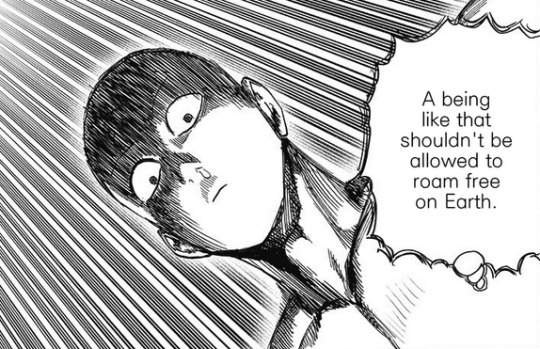
Even Garou who fought against Saitama with everything he has, is completely shocked about how insane Saitama's abilities are, because they defy physic laws like it's nothing, so Garou goes "This is insane! What the hell IS this monster!?" when Saitama sneezed jupiter apart. (Awakening of the gods, chp 168)
Saitama has also shown dubious morality by attempting to punch and kill Garou to avenge Genos, but not really thinking or caring that the entire Earth would become collateral damage like Blast mentions as he portals and contains the explosion in Earth atmosphere. Chapter 166, Squared & Cpt 167, I.o) Saitama's mental state, when normally calm and seemingly well-adjusted, was thrown out of the window when he saw Genos died on him and has now become a PTSD trigger. He literally vented out all that anger in his fist in a massive clash of divine power, as told by the Blastice league.
So if perception bias surrounding Saitama was to turn sideways and he'd get dumped the pressure of the world against him, the consequences might become...bad. Saitama needs to be able to regulate his emotions far better in order to withstand mass scale attack from public opinion. Otherwise ONE is playing with fire with Saitama's mental health state, because he does NOT react well to criticism an such and will lash out like he did during the meteor incident, but far worse.
Thus, a danger to society.
-*-
Tl;dr: King has always been viewed in positive light so people perceive his powers as good thing and non-threat because they believe King is a great hero, whereas Saitama has always been surrounded by negative preconceptions about whatever he seems to be doing and public opinion about his hero status is not good, so Saitama busting out his massive, unknown power would instead cause uproar and mass scale panic that someone is even capable of such.
Thanks all for reading and thank you itsmaferart for this question. :)
#opm#one punch man#saitama#opm king#opm meta#perceptional bias#conditioning#mental health#charanko#opm Bang#Psykos#cognitive bias#my own work#psychology#maslow hierarchy of needs#long post
23 notes
·
View notes
Text
Characters that Zuko doesn't really "get"
As in he doesn't really understand what drives them or how their life experiences influence them and the decisions they make.
Azula (obviously)
Mai
Ty Lee (just see "The Beach")
Ursa
Katara (The whole "Southern Raiders" episode is proof of that in my eyes. He couldn't understand why Katara was angry at him)
Aang (Zuko repeatedly mocks Aang's culture after they've become friends and doesn't get what motives Aang)
Toph
Suki?
Characters that Zuko "gets"
Sokka? (at least a little)
Iroh? (Does Zuko really understand which drives him? Or doesn't drive him?)
Zhao
28 notes
·
View notes
Text
Thinking about any scenario where giving Akechi info leads to crime being solved without a change of heart. Like. In the anime he gets Futaba's uncle legally instead of futaba and joker going on a family bonding metaverse trip (complicated thoughts abt that are for not this post)
Or fics where he handles Kamoshida or something.
This is!!! Actually another example of the larger problem!!!!
If society is so fucked up (and it is) that those who are powerless cannot hope to escape their own abuse, then... this becomes a display of random luck, happenstance, knowing the right person, while others suffer without any prince charming to swoop in and save them.
This becomes "this guys likes you enough to take on this case" and is a further indictment against the system that allows this. It's further proof that when you don't have that, you DO turn to things like a change of heart if you have the means!
Even if Akechi were able to solve all the cases via just detective work (he most certainly isn’t, those cases are of people protected by the very institution he works for), then that highlights the fact that there are others who don't have this privilege.
This is its own type of show of power. Its own type of corruption, that nothing will be done unless you happen to be on good terms with someone who can wield that power
#not even getting into akechis weird relationship with HAVING this sort of power#he can do some stuff! he could probably help in some ways at the mementos target level#though that could so easily be seen as a waste of resources or not important enough or nothing actually illegal has happened.#but AKECHI hasnt had a legal way to get back at abusers either!!!#not these people in power!#he cant touch kaneshiro without losing everything#EVERYTHING he has worked for#even through black mask methods he cant go after people protected by shido too noticeably????#they know the signs of a cognitive death!#p5#goro akechi#p5 meta#crow p5#persona 5#persona 5 royal#persona 5 meta#egg speaks#p5r
35 notes
·
View notes
Text
The Waterloo Vase
But the first time I saw you. Rio. I took that down to the gardens. I pressed it into the leaves of a silver maple and recited it to the Waterloo Vase. It didn’t fit in any rooms.
Chapter 11, Red White & Royal Blue


The Waterloo Vase is a marble vase that stands in the gardens of Buckingham Palace. It is around 15ft high, 4.6m, and depicts the victories at the Battle of Waterloo - hence the name. The height listed varies between 15 & 18 feet, 4.6-5.5m, which probably is dependent on how they measured it.
The vase was initially commissioned by Napoleon, but after his defeat at Waterloo it was presented to the future King George VI, then Prince-Regent, who commissioned Sir Richard Westmacott to carve it. He wished for it to show the final battles of Waterloo.
Initially intended for display in the Waterloo Chamber at Windsor Castle, the weight of the vase - referenced as between twenty and forty tons - meant it wasn't feasible. After a few different locations, it was settled in the Rose Garden in Buckingham Palace in the early 1900s, and has remained there since.
The handles of the vase are depictions of angels, Victory and Defeat personified, with Defeat being shown with a shield atop their head. Above the depiction of Victory is one of Peace, who is presenting the Prince Regent with a palm leaf. Roses, crowns, shamrocks, and thistles are interlinked nearby, representing the national emblems all connected together. Also included were images of George III, then-King who had, at that time, retired from public life due to a mental illness that is now suspected to have been bipolar.
-----
There's something to be said that Henry chose not only to pour his feelings for Alex into something too big to fit inside the palace, but also that it was outside. Henry recalls that he "had better keep it a safe distance away" from himself. All his other feelings and memories were stored inside the palace, closed off and something he lives alongside, his grief and sorrow in rooms he would encounter easily. In contrast his feelings for Alex are placed outside, holding them at arms length so they can't impact him in the way he was so worried they would. They are something he has to consciously choose to revist, they are somewhere he can choose to avoid. There's a beautiful connection between the fact that his feelings about Alex and the Waterloo Vase itself were both too big to fit in any of the rooms at the palace.
The choice of the vase, with its connection to the King who was well known for dealing with mental illness - something comparable with Henry's 'dark days' - as well as George III's connection with the United States, makes it a multi-layered plot device, that on first glance appears to be much more simple than it can be read as. It is possible to draw connections between Henry and George III, tying both into the same link to history as the quotes of queer lovers through the ages Alex & Henry send as postscripts to their emails. While Henry's connection with America is the opposite to George III's - one lost the country whilst the other gained the country, albeit in different ways(!) - that link to the historical connection the UK had, and has, with the USA is notable.
Sources: Royal Collection Trust, Waterloo Vase Queen Elizabeth, Queen Mother image Good Morning Britain Coverage Chapter Eleven, Red White & Royal Blue
#i'm starting a series of learning about things that are referenced in the book#red white and royal blue#rwrb#rwrb movie#meta#i'm having a rough day with my brain wording so this isnt as polished or coherent as id like please give me grace i am cognitively disabled#long post#a series of learning about things that are referenced in the book#elio's#elio's meta
54 notes
·
View notes
Text
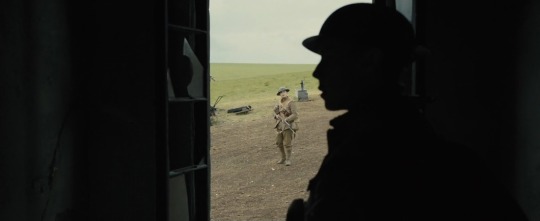
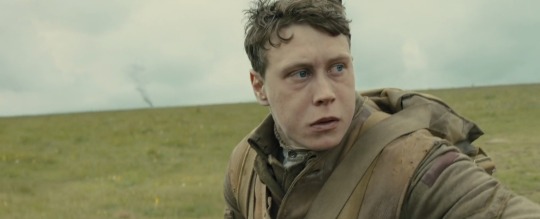
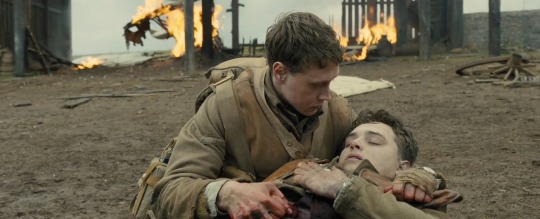
the fact that sco's watching blake through the window when blake's standing in the yard in the very spot where sco watches him get stabbed to death. sco is unable to reach him in the yard (unable to help). all he can do is watch
#len's meta#this is kind of incoherent but i'm too exhausted to actually explain my scattered thoughts better than this#and yes i'm overanalyzing a patch of dirt LEAVE ME ALONE!!!#you know a movie's good when ur willing to genuinely wax poetic about some dirt. i'd die of enbarrasment if the film wasn't a masterpiece#but it IS! so even though im kinda pepe silviaing it up in here i feel like its an intelligent enough film 2 give me room 2 spitball abt#the complexities of it without the major cognitive dissonance i get from analyzing some of my beloved trash films this intensely#like. you cannot pull this shit with the mummy. i love it to pieces and it has a solid plot and it knows exactly what it's doing but i'm#not abt to go off abt the poetic nature of the sand in imhotep's asscrack. it's not that deep#1917 meta#1917#1917 (2019)#1917 movie#1917 film#will schofield#william schofield#lance corporal schofield#tom blake#thomas blake#lance corporal blake
19 notes
·
View notes
Text
Unable to Reconcile
So, looking for any help. There are a couple of things that "bother" me that I can't reconcile. Well, there are others but I'll start with these two.
First, in E1, the tiny, surreptitious half-miracle-each to hide Jim that results in flashing red lights, and loud klaxons sounding off in heaven.
Compared to E6, when Aziraphale blows up his halo. This we are told is perceived as very nearly an act of starting a war, and all we get is a bright flash of light in heaven?
And second, in E1, Crowley initially refuses to help Azi with Jim and storms out. Returns after the chat with Beez, and he has to do the apology dance.
Then in E5/E6, Crowley tells Azi that he won't leave him on his own to deal with the demons attacking the friggin' bookshop, but then Crowley does just that, does not return to help. And apparently that's not egregious enough to warrant an apology dance? In fact, Azi never brings it up in any way. [Granted things got a little bit busy and emotional, but still.]
It feels like the consequences are mixed up with the actions. Or something. But I can't reconcile them, time-wise, chronologically, to match them up with how -- in my brain -- they "should" have been. For example: The miracle=bright flash of light. The "thing with the halo"=red flashing lights and klaxons.
I know that the idea is that Azi and Crowley working together are very powerful. So much more powerful than blowing up one's halo? I suppose it's possible, but it just still bothers me. Along with what warrants an apology dance.
Any ideas? Is it just me?
UPDATE: For a good laugh, follow up with this one about how ridiculous it sounds to swap things around.
#good omens s2#gos2#good omens questions#good omens blowing up a halo#good omens cognitive dissonance#go meta#good omens meta
7 notes
·
View notes
Note
Do you think the portrait in the coffin room is of Gabriellle? Do you think Lestat loves Louis because he reminds him of his mother?
AND ALL HER LIFE CAME TO HER DEFENSE, the years and years of suffering and loneliness, the waste in those damp hollow chambers to which she’d been condemned,

AND THE BOOKS WHICH HAD BEEN HER SOLACE,

and the children who had DEVOURED HER AND ABANDONED HER,

and the pain and disease, her final enemy,

which had in promising release PRETENDED TO BE. HER FRIEND.

#sorry about all that the answer is yes.#vc read#its low-key ok nobody look at me reading this stupid idiot book but its sooooo insane how every couple pages he has this moment of meta#cognition where he's like oh this is sick and wrong. oh this is sick and wrong and I am so afraid rn#and then he's ike AH well nevermind I'm sure it's nothing. anyway! and then he eats a baby#also claudia suffering the trickle down freakonomics of her grandmother's insane fucking twisted psyche#lestat wakes up every morning to affirmation parenting sticky notes that say KEEP generational curses! the cycle of abuse depends on YOU!!!
65 notes
·
View notes
Text
of Men again
AKA "Gold, East, Easterlings, humans in general and other evil-coded stuff" AKA "no, Morgoth, your trademarks are invalid" AKA "reclaiming the symbolics" AKA "another post on reading Tolkien in Christian context"
And by "Christian context" I mean less the values and more the "Silm is a fantasy prequel-fanfic for the Bible, especially the New Testament" (which is at least in some points of Tolkien's life, how he wrote it)
And as all fanfic authors, GMs and generally people working creatively in a preestablished world, especially one with some preestablished future, there's no fun like foreshadowing. Seriously. Adding foreshadowing to everything is the best creative fun. OK, I'm biased. Anyway
So, what do we have in the Silm? West is Valinor, East is the evil guys. Also, dark-skinned guys are generally in majority (I know Bór exists) evil (which is racist, but we'll make it less-racist in a moment) and serve Morgoth. He just goes and claims stuff as his own, and the Valar hold on to what is left.
hmm... I wanted to add silver/gold and moon/sun divides here, but they get complicated and aren't a good example, even if I instinctively map them to the West/East divide. I think it's just me in this case.
What do we have in the Bible? Where do the main event happens? East. To this day, churches face east, because east is the holy-ish direction. Also, symbolically, sunrise is a big thing.
That's a good metaphor for the elf-human difference. Elves are chasing the sunset, so that the last rays fade slower and last so very long. Humans cannot chase. The night falls upon them, but then the sun rises anew (spoiler: it doesn't set after that). But first the night must fall. And it is sad and scary and all that.
West-facing Elves versus East-facing Men.
So, back to the main event. Easterlings... well, the Jews aren't very pale-skinned or grey-eyed or beardless. To put it mildly. So it's kinda "Tolkien is racist in places", but maybe also kinda "Tolkien goes for maximum contrast and Morgoth getting defeated from the center of the lands he'd claimed as his own" maybe. a bit.
Like maybe in his mind putting so many evil Easterlings into the story still balanced well, because hey, later they got Jesus and all His early blorbos followers? Or maybe I shouldn't go guessing what was Jirt thinking.
Anyway, if you look at Silm as a Bible fanfic, some things suddenly jump into places.
I'm not saying it's the only way to look at it, I recently listed 2 or 3 (if we count Arthurian myth as separate) other angles. Silm is multidimensional, various parts of the story make sense when looking from various angles, that's why it's so incoherent at times.
#turning my back at the Valar#sorry couldn't resist a dramatic tag#I like puns#and dramatic irony and a particular kind of cognitive dissonance#long#this whole post is basically assuming that Tolkien did a thing I would love doing if I was in his place#maybe he did part of it by chance idk#:D :D :D#rambling in tags again#tolkien#silmarillion#tolkien legendarium#silm#the silm#tolkien meta#rambling#sweet sad sunset-chasing blorbos#this whole book is so sad#unless you read it as preqel-fic and then much of the sad gets ....whatever to call it#and that's awesome#I probably shouldn't call it hilarious but#if I were Jirt I'd have fun writing that#and some of the quotes I quoted in the previous post that too#I would have fun#I hope he had fun
6 notes
·
View notes
Note
If I may be so bold as to ask: what's the Japanese term for "cognitive pscience"?
Hello! and apologies to all your fellow ask-senders who sent great asks and now are trapped down in essay writing hell, you are on the Heap
The original term we render "cognitive psience" is 認知訶学 ninchi kagaku. It seems to be pronounced the same as the standard 認知科学 ninchi kagaku (cognitive science), but the third kanji is different.
Futaba explains it for us:

Futaba 認知『訶』学な! 科学の『科』じゃないぞ、摩訶不思議の『訶』な! そこ大事。 ninchi kagaku na! kagaku no "ka" ja nai zo, makafushigi no "ka" na! soko daiji Cognitive psience, with a PSI in front! Less science, more supernatural. That's important.
Literally, it's "ninchi kagaku"! (cognitive psience) It's not the "ka" in "kagaku" (science), it's the "ka" in "makafushigi" (profound mystery)! That's important.
Here are the two kanji:
科—meaning "department, course or section", it crops up in words like 科学 kagaku, "science", 科目 kamoku, "subject (like in school)", and 科名 kamei, "family name (as in biology)".
訶—this one literally means "to scold"! But in combination, it gives us 魔訶 maka, a Buddhist term meaning "great"—which combines with 不思議 fushigi, "mystery", to give us Futaba's makafushigi—"profound mystery".
So this is a really cute translation—just like the original, the English phrase "cognitive psience" is pronounced the same, but written differently, and the meaning is even close. My hat is off to the translator who came up with it.
112 notes
·
View notes